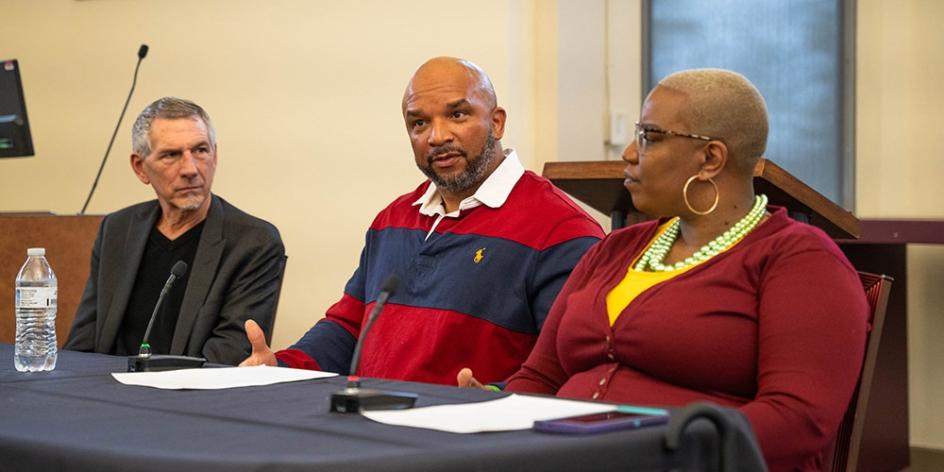
Re-entry into society following incarceration can be very complicated. But add to the mix a wrongful conviction, and it can become downright traumatizing. But one former inmate, imprisoned for 17 years for a crime he did not commit, has maintained a positive mindset throughout his incarceration and since his release 11 months ago.
Last Thursday, Richard Horton visited Heidelberg, along with his wife, Janette, to share his story of gaining his freedom through the work of the Ohio Innocence Project. Pierce Reed, the Innocence Project’s director of Policy and Engagement, accompanied them.
“We need to communicate these great stories. We need people to have awareness,” Pierce told Dr. Sarah Lazzari’s Intro to Criminology class and more than 30 additional ’Berg students.
Attorneys and students at the Ohio Innocence Ohio Innocence Project work to help wrongfully convicted inmates get out of prison and get the justice they deserve. “The government gives you physical freedom. But true freedom – economic freedom, spiritual and emotional security, no government can give you that,” Pierce said.
Since 1989, about 3,500 individuals who have been wrongfully convicted have gained their freedom – 110 of them Ohioans. Richard Horton is one of them.
Richard’s story
The condensed version of Richard’s story goes like this: Secure in his innocence, he turned himself into Columbus Police in late 2004 on charges of aggravated robbery, felonious assault and other allegations in connection with a home invasion and shooting. In February 2006, he was convicted and sentenced to 23 years in prison.
“This was a big shock. It was horrific,” said Richard, then 28 years old.
Over time, he had reached out to the Innocence Project, “just trying to get someone’s attention.” They finally connected in 2015.
In Richard’s case, law school students figured out a new form of DNA testing which was used on the shell casing from the gun fired during the crime. In 2019, tests identified a DNA profile that excluded Richard as the perpetrator.
Richard never wavered in his claim of innocence. He was granted a new trial and released on bond in 2022. Ultimately, there would be no new trial. The prosecution dismissed the case in May 2023.
“I thank God as many times as I possibly can,” he said.
Janette’s story
Richard and his wife, Janette, had been married just six months when he was incarcerated. The whole experience took a toll, but they stood together because both believed so fiercely in Richard’s innocence. And their love story.
The trial itself was so frustrating, Janette said. “It was very stressful. I got very sick,” she said. “It was so hard to sit there and have to listen” to the testimony. But she had strong, unwavering support from her family as well as Richard’s family. Through the years, she was asked many times, “Do you think he’s innocent?” Her response, every time, was “It’s not a question. It’s a fact. I never had to defend him to my family.”
The hardest part was going on visits, Janette said. Richard has two young children and she worked with his ex-partner to make sure he could see his kids while he was incarcerated too. Post-release, the couple has had to adjust to being together again, she said, “It’s a nice adjustment. I’m just happy to have him home.”
Today
Richard still deals with the trauma of the wrongful conviction: PTSD and depression, as does Janette.
Throughout the turmoil of incarceration, he kept perspective and a positive attitude.
“When you’re incarcerated, there’s a lot of chaos. Quite a few of these gentlemen are never going home. That made me even more thankful and helped me keep my sanity and stay calm.” It wasn’t easy. Richard passed the time working out, doing sports and reading a lot. Every day was a battle.
“There are some things I will never get back,” he said, “but I’m OK.”
It would seem reasonable to be angry at the time lost and the failure of the criminal justice system, but Richard has no time for that. “I’m just so happy justice was done. I don’t feel like I should carry anger into my new life. I really just want to move forward.”
Despite the stigma of being in prison, Richard today has a good job and good health care for his family. It all plays into his mission to help create awareness for others wrongfully convicted
“I don’t mind the stigma. I see it as an opportunity, a teachable moment. I try to embrace it. …
“I don’t have time for ‘oh, woe is me' moments.”